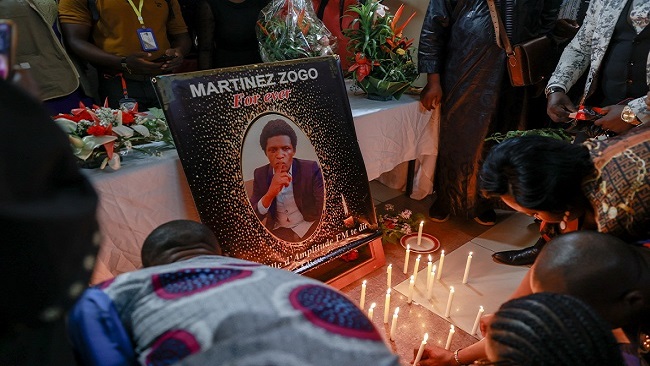The web of corruption, lies and revenge behind the killing of Martinez Zogo
A dossier of bank slips detailing suspect payments of millions of dollars handed to the journalist brought the downfall of a political upstart in Cameroon. But it also led to Zogo’s murder. His colleagues went to investigate why:
Martinez Zogo was 50 when his body was found on an empty plot of land in Ebogo, Yaoundé, Cameroon, on 22 January 2023. He had left his radio station, Amplitude FM, at about 8pm on 17 January. People saw a group of men in a black Toyota Prado follow his car. So, apparently, did Zogo, as he drove quickly to a nearby police station.
But the gate was closed, his car was jammed in by the Prado, and the journalist was spirited away. Five days later, his naked corpse was found dumped on the outskirts of the capital. According to Amplitude FM’s editor-in-chief, Charlie Tchouémou, who identified the body, Zogo’s body had a broken right foot, multiple severed fingers and a twisted tongue.
Cameroonian police arrested the alleged mastermind of the killing: the Gucci-suited media tycoon Jean-Pierre Amougou Belinga, owner of the television channel Vision4 TV and the newspaper L’Anecdote.
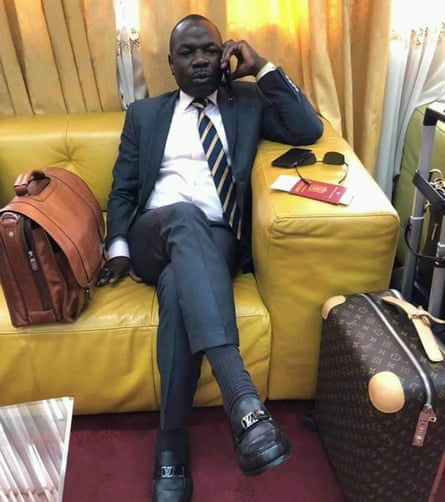
There was a confession – by an alleged accomplice, a police lieutenant colonel called Justin Danwe – and a motive.
Belinga would have been angered by the journalist, whose full name was Arsène Salomon Mbani Zogo, and who had, in the week before his abduction, forcefully accused him on air of large-scale corruption. When Zogo’s remains surfaced five days after his kidnapping, the police concluded that this had been Belinga’s revenge.
A detailed statement that they claim was made by Danwe, the deputy director of Cameroon’s General Directorate for External Investigations (DGRE), which has been widely circulated in Cameroon, appears to leave no room for any other conclusion. Danwe confessed to leading the assailants, saying Belinga had paid him and others $60,000 (£47,000), and took part in the beating, which, Danwe said, took place on a construction site belonging to Belinga.
Danwe also incriminated Belinga’s friend Laurent Esso, the justice minister, who he said was phoned during the beating and asked: “What else they should do?” Danwe claims Esso responded that they should “finish the job”. According to the police, Danwe also said that his boss, the DGRE chief, Léopold Maxime Eko Eko, was involved and that the black Toyota Prado was Eko Eko’s. On Danwe’s statement alone, police went on to arrest close to 30 other men he claimed were involved.
Police told Reporters Without Borders (RSF) that “an examination of the phones of the suspects has confirmed that calls were made between Belinga and Danwe, and between Belinga and justice minister Laurent Esso, on the evening of the murder”.
The RSF report says that the “volume of evidence” means a reconstruction of the murder “no longer seems to be a priority for the [police] investigators”. Which means Cameroonians do not know precisely what happened between the day of Zogo’s abduction and the discovery of his body – let alone what the role was of all 30 men allegedly involved in the killing of one journalist, and how many might have fitted in the Toyota Prado.
We, Zogo’s colleagues from the Network of African Investigative Reporters and Editors (Naire), were concerned that the explanation for our friend’s brutal killing seemed too simple. Naire launched an “Arizona Project” – a model dating back to 1976, when journalists from all over the US came together in Arizona to finish an investigation that the reporter Don Bolles had been working on when he was murdered by members of an organised crime group. The “Arizona” motto is: you can kill a journalist, but you cannot kill the story.
A team of Naire members – David Dembélé from Mali, Selay Kouassi from Ivory Coast and Bram Posthumus, a Dutch national who lives in Abidjan, Ivory Coast – landed in the Cameroonian capital, Yaoundé, on 12 April 2023 to find out if Zogo’s exposure of corruption had led to his murder.

The ageing autocrat Paul Biya has been president of Cameroon since 1982. There was suspicion that the political vultures circling around Biya may have set up the story that killed Zogo to rid themselves of a competitor.
Belinga had enjoyed an astronomical rise in politics. It had been noted that Belinga’s wife compared herself to the first lady, Chantal Biya, known for her flamboyant red wigs. “At least my hair is natural,” Mrs Belinga had said at a public ceremony at an orphanage only weeks earlier.
Before 1995, few in Cameroon knew much about Jean-Pierre Amougou Belinga. From a farming background, he was born in 1965 in Cameroon’s central region, and moved to Yaoundé as a young man. He found a job at a newspaper, where he was mentored by its editor, Gilbert Baongla. Baongla openly called himself the (extramarital) son of Paul Biya – without ever being officially contradicted.
Belinga learned how to make influential friends. Stories abound about his tactics, such as how he could even imitate the voice of the president on the phone.
By the time Belinga started his own newspaper, L’Anecdote, in 1995, he had served a prison term for extortion of the then-director general of the National Water Corporation, Clément Obouh Fégué. In 2006, he caused uproar with the publication in L’Anecdote of a list of 50 alleged “homosexuals” in Cameroon that included ministers, heads of state corporations, clergymen and media celebrities.
It almost caused a cabinet reshuffle, as conservative public opinion demanded that ministers be “flushed out”. But soon all went quiet. Senior officials threatened court action against Belinga but did not follow through, apart from the labour minister, Grégoire Owona, who won his defamation case and saw Belinga jailed for four months.
Belinga’s business empire expanded to include finance, property, education and public works. “And it’s all because of blackmail,” a close relation of Belinga claimed to a ZAM magazine reporter. “The list of 50 contained only those individuals who refused to give him money. He continues to blackmail [a lot of people] in this way.”
Zogo would certainly have annoyed Belinga, that much is clear. On his live show, Zogo had repeatedly said that he had a dossier on the man. This dossier was allegedly full of bank slips, payment instructions and tables of sums amounting to tens of millions of dollars, printed out by what appeared to be government office printers.
Zogo had gone into detail, listing alleged payments to Belinga from state coffers to the equivalent of $79m over 10 years. “I have the proof,” he told listeners. “I already sent it to the president.”
Known as a Biya supporter, Zogo believed the president to be above corruption.
There are so many corruption cases. But Zogo talked only about Belinga. Why?
Cameroonian journalist
But the arrest of the journalist’s alleged murderer has provided scant relief to civil society. Wherever Naire reporters go, the fear and silence are suffocating. People – from anti-corruption groups to lawyers, parliamentarians and fellow journalists – are not answering their phones. Or they promise a meeting and then don’t show up. Or are just very cagey indeed.
Two subjects seem taboo: any investigations into corruption involving anyone besides Belinga; and the succession of Biya.
There are whispers: Belinga was a rival to other players in the palace power wars. Factions are fighting for access to the throne and the state coffers, positioning for the moment the president dies. Belinga’s arrest has removed one important rival.
The fear is infectious. Two other journalists have been killed in Cameroon since the Zogo murder and the Naire team’s hotel – the Kremlin, named because the “owner is a great fan of Vladimir Putin”, a staff member says – seems well suited for interviews with worried people who mostly talk in vague allusions.
Hundreds of propaganda outlets are financed by political factions in the country, but there are those who question the official narrative around Zogo’s death.
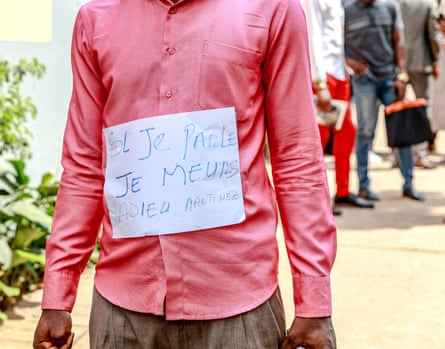
“There are so many corruption cases,” says one journalist who reports from Cameroon for French media. “But Zogo talked only about Belinga. Why?” He talks of Zogo’s dossier being “full of proof”.
“Why a whole dossier only about Belinga?” the journalist asked.
Naire has seen Zogo’s dossier. It is impressive, featuring apparently genuine government bank transaction printouts, Excel spreadsheets of payments from government budget heads to Belinga’s companies, and signed payment instructions by senior civil servants.
There were alleged payments to Belinga from various state budgets dating back to 2013, with dates, names and amounts of money to pay for his Gucci business suits, security, transport and even fire extinguishers for his office.
Though the footers of most pages had been deleted, it can be seen that much of this dossier had been output by a printer in Probmis, the budget information systems program of the ministry of finance. Someone with access to the government computer system had seemingly searched for anything relating to Belinga and printed it out. It was a 137-page journalist’s dream.
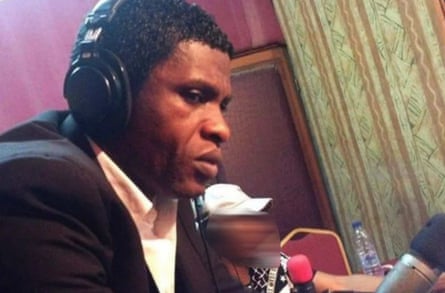
“But that information was all over Cameroon already,” says the source. “Many of us knew about this.” Zogo had circulated the entire dossier not only to the presidency but also to government departments, police, the two anti-corruption commissions, the courts, the secret service and colleagues in the media, on 22 December 2022, more than three weeks before he died.
The allegation that $79m had been paid to Belinga from state coffers was even older. It had been made by other news outlets too, and he had already taken one to court for defamation. By 1 December 2022, the date the dossier was printed, Belinga had long been facing a tax bill of $50m over undeclared income dating back to at least 2021.
Reports about the Cameroon government’s grant funding to Belinga to buy a France-based TV channel for the diaspora called Telesud had caused an outcry as far back as February 2020. “Telesud has an audience of zero,” a commentator wrote at the time. “Is this not just money laundering?” Another commentator on Actu Cameroun was outraged that “millions” were used for salaries for staff in France “for a channel that nobody watches”.
In the controversy around the Telesud deal, Belinga was publicly supported by at least two government ministers. In parliament, the finance minister, Louis-Paul Motaze, said the esteemed representatives should “applaud” Belinga, because he as a Cameroonian had had the “ambition” to “buy assets in a white country (chez les blancs)”.
Belinga was also a vulgar man, not sophisticated at all. He was getting too big for his boots
Senior media source
From 2020 onwards, reporting involving Belinga more frequently pointed to such payments, also propping him up as a presidential contender. In July 2020, a website called the Cameroon Intelligence Report denounced a “conspiracy to make Belinga president as the figurehead of a government faction”.
Belinga’s alleged friends in government were Motaze and justice minister Esso. According to the police, Esso had allocated state-paid prison guards as private security for Belinga’s home. Zogo had repeated accusations against Esso and Motaze as Belinga’s paymasters during one of his broadcasts.
“They were the faction positioning Belinga,” says a senior media source. “Others didn’t like that.” What was even more irritating, they add, was that “besides the issue of the different factions, Belinga was also a vulgar man, not sophisticated at all. He was getting too big for his boots.”
“We should look at the others,” agrees a colleague close to corruption investigations in Cameroon. “The others are what nobody talks about.”
He shows his own dossier – documents from the tax office. A letter dated 5 July 2021, signed by the then director general of Cameroon’s tax agency, Modeste Mopa Fatoing, is in the file too. Fatoing instructs his staff to “urgently look at these affairs”.
Sixty-seven foreign exchange companies, tourist and transport firms, mining companies, hotels, money-transfer agencies, financial consulting companies, a consortium in Strasbourg, and even one “jeune fille ambitieuse”, a “young and ambitious girl” behind a vehicle and touring company for high-end visitors to Cameroon – the papers, stamped by Cameroon’s revenue service and covering the four years from 2017 to 2021, show large amounts paid from state accounts to these entities in order of value, from the equivalent of $275m to much smaller sums.
About $656m has been paid by the state to companies in Nigeria, Togo, France and the US. One is in Equatorial Guinea, one is led by an Italian, one organises tourist trips to Central African Republic. There is also a line with the name of a billionaire businessman, reportedly close to Biya, in South Africa.
Many seem to have one characteristic in common: the ability to channel money out of Cameroon.
Corrupt political leaders and their friends “always like tax havens”, says tax expert Yolisa Pikie, who has investigated the billions of dollars siphoned off during Jacob Zuma’s reign in South Africa.
“But you especially need to take your illicit money out when there is political turmoil. You may have kept some of it in bags in your house previously, but now you are not sure what will happen if a rival comes to power.”
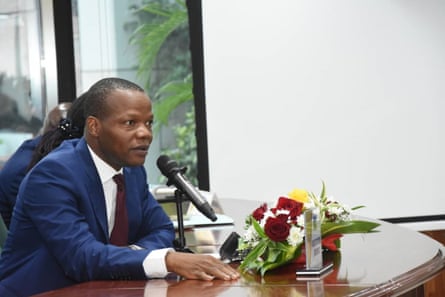
Cameroon’s power players are notorious for keeping enormous wealth in their houses, and there was an escalation in getting loot abroad around 2017 when the president’s age was coming under scrutiny.
To date, however, nothing appears to have happened in this investigation. Fatoing was moved from his post by Biya, to take up a position at the International Monetary Fund in Washington in January.
In January 2022, Biya ordered a travel ban against Belinga, because “he is under investigation for deals with ministers”. In February 2022, he ordered an audit into all government money paid in irregular ways, dating back 12 years, from 2010 up to and including 2021. All that surfaced from this exercise in the media was, once again, reports on money received by Belinga.
“Cela arrive dans un contexte de suspicions nées de la circulation, toujours dans les réseaux de documents faisant état de l’utilisation des lignes en question pour le financement des activités de Jean-Pierre Amougou Belinga,” writes the online news site ecomatin.net. “This [audit] happens in a context of suspicions born from the circulation of documents reporting the use of the [budget] lines in question for the financing of the activities of Jean-Pierre Amougou Belinga,” making it appear again as if Belinga is the only one ever to get such payments.
According to Biya’s own published assessment, the total of these budget lines since 2010 amounts to $8.5bn, close to 12% of all state budgets. According to the Zogo dossier, payments received by Belinga over the past 10 years were $79m, just under 1% of this total.
In August 2022, a summons for a court hearing was issued to a very significant person. The powerful Ferdinand Ngoh Ngoh, the secretary of state, is known to command practically every department in the government “on the highest instructions of the supreme head of state”. He is a close confidant of Biya’s wife, she of the giant red wigs, who has a faction in the palace wars named after her.

The court in Cameroon began investigating reports that Ngoh Ngoh was behind the disappearance in 2021 of $123m in donor funds meant for Covid relief. Alerted to this, some media in the country started looking into amounts Ngoh Ngoh’s office received. In October 2022, the court issued an arrest warrant for Ngoh Ngoh.
But on 28 October, Biya ordered the suspension of the warrant, declaring his full confidence in Ngoh Ngoh. A little over a month later, government printers apparently spewed out Zogo’s dossier data about all the supposed payments to Belinga over the past 10 years. It’s not clear who gave it to Zogo, but he began circulating it around Yaoundé with a covering letter dated 22 December 2022.
Belinga is a thug … And he does know how to get sections of the secret service and the police to do his bidding
That Belinga would have killed Zogo “is possible”, one source said.
In 2022, one of ZAM’s reporters in Cameroon, who had written a critical story about Belinga, was badly beaten on his own doorstep by men who claimed to be working for the media tycoon. Belinga has also been linked – allegedly through hired men – to street fights and violence.
He was charged and briefly jailed before being released in connection with the murder of a young man called Bryan Formbor, the ex-boyfriend of a Vision4 TV anchorwoman, Ivana Essomba, herself now on trial for the killing.
“He is a thug. He might have gotten into a rage. And he does know how to get sections of the secret service and the police to do his bidding, through bluster and blackmail and leveraging powerful friends,” says the source. But he agrees that in a situation where Belinga knew that a powerful cabal in the presidency was out to get him, killing Zogo was not a clever thing to do. “He is reportedly now worried about being killed in jail, because powerful factions don’t want him to talk.”
The opposition leader, “Iron Lady” Kah Walla, speaking in her office in Douala, has been arrested more than once for speaking out. She cautions: “You may think that the Biya regime is ready to collapse, but there is a whole sophisticated political engineering behind it. It is a scientific dictatorship.
“Biya, old or not, is a master of violence. He practices irrational violence; violence without cause and without logic. Everyone is afraid, since no one knows the limits not to cross.”

She is convinced that in the Zogo case, a “faction within [those in] power wanted to use the murder to destroy this other branch. This is what led to all these arrests of high personalities within the circles of power. All the whistleblowers are close to the regime.”
After the killing and arrests, everything stopped abruptly, she adds. “As if there had been some sort of agreement between the warring branches; as if there was an overnight meeting during which they decided to put the ball down. Like they said to themselves: ‘If I fall, you fall too.’ Suddenly, overnight, there were no more arrests.”
Months after the murder, there is neither news on a trial date nor about the audit into the government funds, nor about the tax investigation into the 67 instances that funnelled so much state money out of Cameroon. The tax director who had pushed for an inquiry is gone.
Motaze and Esso are “quiet now” as well. “They almost arrested Esso, too,” says the senior editor colleague, grinning. Few government ministers are liked in Cameroon.
Meanwhile, Kah Walla and her team are demanding investigations into another, lesser-known murder, of Zogo’s journalist friend Jean-Jacques Ola Bebe, who was shot on 3 February 2023. No one has been arrested in his case, but – just like Zogo – Ola Bebe had made a public accusation just before his death.
He had defended Belinga. He had told the presenter on private broadcaster Mo’o TV’s daily show Boîte Noire that journalists should be impartial because even “your own camps won’t guarantee your survival”. He went on to say that “you get used and afterwards, there is no other win for them, on the contrary, now you are an embarrassing witness … at some point you might tell people that it was so-and-so who gave you these documents. And voilà.”
He was found dead the next morning.
Belinga, Danwe and Eko Eko are in jail awaiting trial. Esso has not been arrested. According to a Cameroonian news site, however, he has been asked by President Biya “to explain himself”.
Culled from The Guardian

